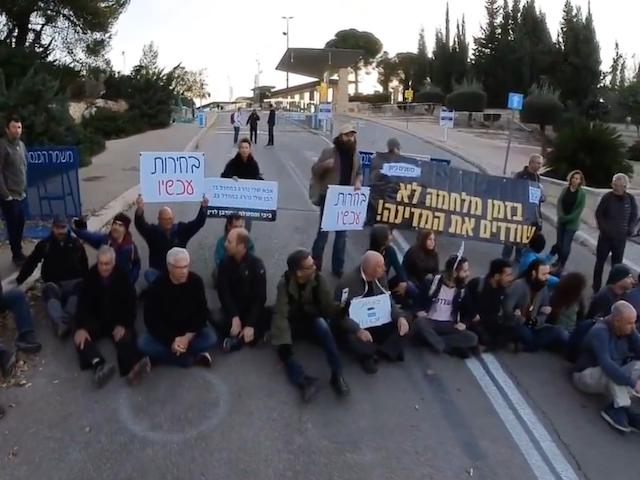In a remarkable display of public dissent, approximately 40 demonstrators gathered outside the Knesset on Tuesday, signaling a growing impatience with the ruling coalition's handling of national crises. These Israeli citizens, united in their frustration, staged a sit-in, effectively blocking the Knesset's entrance and vocalizing their demands for immediate elections.
The demonstrators, a cross-section of Israeli society, accused the government of neglecting its duties on several fronts. They cited issues like the mismanagement of the national budget, the government's failure to effectively address the situation of Israeli hostages in Gaza, and a perceived decline in Israel's international standing. The core of their grievance is the call for "elections now" – a demand for a swift change in leadership and the ousting of elements they deem as extremist from the government.
עשרות שוטרים פינו בכוח את המפגינים הגיבורים שחסמו את הכניסה לכנסת. כאן מרימים אדם בן שמונים. הממשלה חייבת ללכת עכשיו! כל רגע שהממשלה הרעה הזאת בשלטון מעמיקה את האסון ופוגעת בישראל. pic.twitter.com/HWu1nCrrWR
— Hagit Ofran חגית עופרן (@hagitofran) January 8, 2024
This protest comes against the backdrop of mounting criticism towards Israel's response to rocket attacks from Gaza, spanning across the political spectrum. The situation escalated on Monday when police intervened to disperse another group of protesters, which included relatives of those held captive in Gaza. Their act of civil disobedience, which involved obstructing traffic to the Knesset, ended with police intervention and the arrest of a protester.
Central to the protesters' narrative is a deep-seated frustration with Prime Minister Benjamin Netanyahu. Currently facing a trial on multiple charges including fraud and bribery, Netanyahu is accused by his detractors of manipulating political systems for personal gain. The protesters' message is clear: the loss of 1,500 citizens, a consequence of what they perceive as Netanyahu's personal vendetta, is a glaring testament to his unsuitability to lead. Many in Israel blame Netanyahu for allowing Hamas to build and grow a terror network, often capitulating to enter ceasefires long before military objectives were met, and enabling millions of dollars meant for terror into the Strip.
The call for change is growing louder by the day. Netanyahu's popularity has plummeted following the Hamas-led invasion on October 7, which resulted in tragic loss of life and the taking of hostages. Public opinion, as reflected in the latest Israel Democracy Institute survey, indicates a mere 15% support for Netanyahu's continuation in office post-conflict.
Dozens of protesters block Israeli Knesset's entrance, chant 'Elections now' https://t.co/CdQMmAPKVr Haaretz pic.twitter.com/ZhLpdgjkgv
— Jewish Community (@JComm_NewsFeeds) January 8, 2024
The discontent is not limited to small-scale protests. In Tel Aviv and Caesarea, thousands have rallied, echoing the demand for new elections. These large-scale demonstrations draw participants from diverse backgrounds, including those directly affected by the conflict with Hamas.
Recent polls reveal a political landscape in flux. The Kan public broadcaster's latest poll suggests a significant shift in party standings, with Benny Gantz’s National Unity party gaining ground over Netanyahu's Likud which drops down from their current position of 33 seats by over 13 seats. This shift is indicative of a populace seeking change, possibly leaning towards a more centrist governance.
סקר מנדטים של כאן חדשות הערב בהשוואה לסקר האחרון שלהם לפני המלחמה (26/9):
— Gil Feldman (@feldman_gil) January 7, 2024
ליכוד: 7-
יש עתיד: 4-
ציונות דתית ועוצמה יהודית: 3+
המחנה הממלכתי: 3+
ישראל ביתנו: 5+
קואליציה: 4-
מגיע לנו בחירות בהקדם. pic.twitter.com/gLBnmwxCx3
As Israel navigates these turbulent times, the voices of its citizens, clamoring for a reset in the nation's political and strategic direction, are becoming increasingly impossible to ignore. The call for elections, a change in government, and the expulsion of what is seen as extremist elements, reflects a deep yearning for a new path forward, one that aligns more closely with the aspirations and needs of the Israeli populace.


